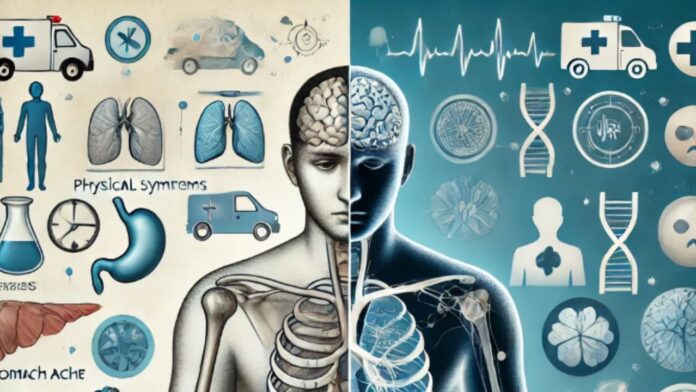The body is a conductor of emotions and sensations. Every day, all our lives, a huge amount of emotions passes through the body. For example, the sadness of parting with a loved one or the joy of a successful football match with Bet22. Some pass and disappear. Some of them get stuck in our bodies and leave a trace inside them.
The connection between the body and the psyche is very strong. Therefore, it often happens that a mental state has an impact on physical health.
What Is Psychosomatics?
Psychosomatics studies the relationship between mental and physical manifestations of diseases. She explores how emotions, stress, and psychological factors affect the body’s functioning and can cause various symptoms.
Conditionally, what concerns health and well-being can be divided into two large groups:
Physical Symptoms (Medical)
Those that are caused by a specific disease or physical factor.
For example: you have broken your arm and feel pain (a physical factor), or you have a stomach ache due to aggravated gastritis (a specific disease).
In case of physical symptoms, medical examination and treatment are required.
Psychosomatic Symptoms
Psychosomatic symptoms may not have a direct physical cause and may be related only to your psychological state. These symptoms can be caused by stress, anxiety, depression, or other mental health problems. In such cases, psychological help or therapy may be required.
Psychosomatic symptoms do not mean that the disease is simulated or made up. They can be quite real and interfere with normal life. Therefore, it is important to take such symptoms seriously and seek help from appropriate specialists.
The difficulty is that it can be very difficult to determine the root cause and unambiguously attribute one or another symptom to a physical or psychosomatic one.
The Main Signs of Psychosomatics
Several signs may indicate that the root cause of the disease/poor health is psychological factors.
Let’s take a closer look at the examples:
- A medical examination cannot detect the disease, but the symptoms are present. For example: stomach aches, but the examination does not reveal the causes, the doctor says you are healthy, while you feel pain/ discomfort;
- The same disease repeats often, may subside at some point, and reappears regardless of treatment. You feel like you can’t control it and manage it. It happens all of a sudden. But if you analyze it, you can notice patterns of symptoms. For example, the symptom occurs after talking to someone or about something /at a certain time/in a specific place/next to someone;
- The presence of pain or disease implies “privileges”. For a person, this is the only or most affordable way to get what they want for themselves. A child who unknowingly often gets sick in childhood to get special attention from parents or something that parents do not allow at other times;
- Traditional treatment does not help to remove the symptoms. An allergic reaction on the skin that does not go away from medications and ointments only goes away when you stop being nervous /end a relationship with someone;
- The disease was promoted by emotional shocks, psychological trauma, traumatic situations, etc. The disease manifests itself as a reaction to certain events and emotions. Some kinds of shock and emotions leave a mark on the body and cause problems, for example, with the gastrointestinal tract, heart, and nervous system. It may take time before the disease manifests itself (3-6 months). By the way, stress can also occur in connection with positive events, for example, a wedding, a move;
- The disease appears as an organism’s resistance to an event. For example, you have been appointed to a new position with great responsibility and new powers for you – and on the first working day, you get sick.
Classic Psychosomatic Diseases
A group of scientists from the University of Chicago in their study identified a link between stress and seven diseases.This list of diseases is called the “Holy Seven”.
Thus, a list of classic psychosomatic diseases has been obtained. These include:
- bronchial asthma;
- ulcerative colitis;
- hypertension (increased blood pressure);
- hyperthyroidism (hyperthyroidism);
- neurodermatitis;
- rheumatoid arthritis;
- peptic ulcer of the stomach and duodenal ulcer.
Conclusion
Understanding the boundary between psychosomatics and medical symptoms is crucial for comprehensive health management. The intricate connection between the body and the mind means that our emotions and psychological state can significantly impact our physical well-being.



















![10 Countries With the Best Healthcare in the World [Statistical Analysis] Countries With the Best Healthcare in the World](https://articleify.com/wp-content/uploads/2025/07/Countries-With-the-Best-Healthcare-in-the-World-1-150x150.jpg)









